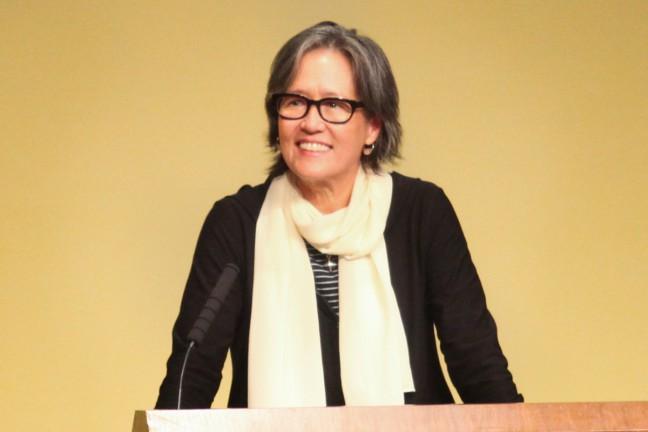Ruth Ozeki, author of “A Tale For the Time Being,” the University of Wisconsin’s Go Big Read Book for 2013, spoke on how to bring the novel’s central theme of living in the moment into everyday practice at an event on campus Monday.
Ozeki’s self-titled talk, “How to Be A Better Time Being,” included six tips on how students can better live in the moment and outlined important parallels between life and literature. In her Wisconsin Union Directorate Distinguished Lecture Series address, Ozeki focused on the importance of living in the current moment, embracing the present as well as the past and being the best “time being” people are capable of being.
She described a “time being” as anyone living in time, or someone existing in a moment. She emphasized the six points that most embrace and accentuate personal usage of time and life, including honoring one’s ancestors, asking questions and being curious, along with the importance of taking your time and studying the nature of time.
Chancellor Rebecca Blank introduced Ozeki to the audience. Blank said she regarded the book as “a complete pleasure,” adding the novel is focused on two “compelling” narrators, a teenage girl in Tokyo and a struggling author in British Columbia.
“[The novel] asks us as readers to contemplate the danger and the meaning of time,” Blank said.
Ozeki said it took her 10 years to write the novel. During that time, she was also studying and practicing zen, taking care of her mother, who had developed Alzheimer’s disease, and writing her memoir. She said her personal philosophy on her life experiences was incorporated into her writing.
“Nothing is wasted, everything that happens to you ends up being material for a novel,” she said.
Ozeki added it was also during this period of her life that she began thinking more about the concept of time.
By experiencing the deaths of loved ones, Ozeki said she became more acutely aware of the passing of time and how fleeting life can be. It was through these experiences that Ozeki said she began writing the novel.
“When people near to you die, it changes your relationship to time and it makes you very aware that we are all ‘time beings’ with a time limit,” Ozeki said.
Just as she was putting the finishing touches on her book, she said the earthquake and tsunami hit Japan in 2011. The event caused her to view that first draft as no longer relevant, and Ozeki said she worked to rewrite her book in a way that would relate to the post-disaster world she was living in.
During her closing remarks, Ozeki outlined the final two steps to being a better “time being;” practicing patience and “cultivating one’s superpower.”
To demonstrate the last step, Ozeki led the group in a brief meditation, inviting the audience to sit upright on the edge of the seats in silence, close their eyes and pay attention to their own breathing. She described the process as “mindfulness meditation,” or a way to become intimate with one’s mind.
Ozeki said “mindfulness meditation” has great importance as it relates to time and its effect on everyone as a “time being.”
“[This process] allows us to rest in a more spacious awareness of the present moment and practice patience,” Ozeki said.













